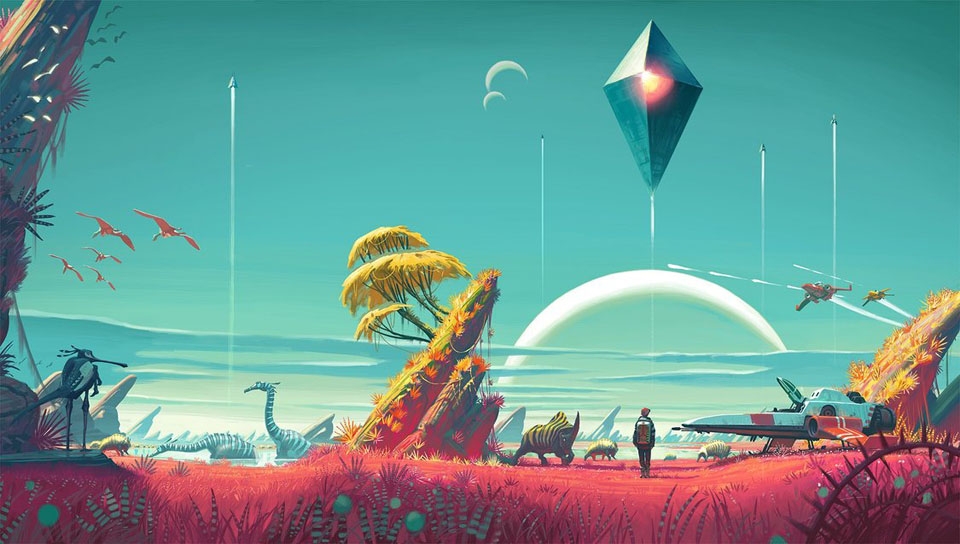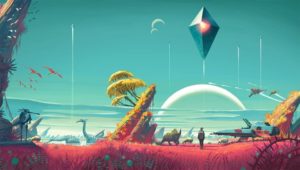

First announced in 2013, “No Man’s Sky” promised a near-infinite universe for players to discover. Unfortunately, many gamers were underwhelmed with the final product, leading to low user reviews.
By Grant Stoner | The Duquesne Duke
On Dec. 9, 2013, Hello Games’ Sean Murray unveiled to the world an exciting and unprecedented vision. Created by a team of only four developers, the first trailer for “No Man’s Sky,” advertised space exploration on a never-before-seen scale. The procedurally-generated universe, according to Murray, offered approximately 18 quintillion planets, each with their own unique ecosystem and events. Exploration was the name of the game, instantly grabbing the attention of gamers and critics alike.
For roughly three years, “No Man’s Sky” accumulated countless awards, including E3 2014’s “Best Original Game” — an impressive feat for an indie title. With every conference and award show, footage of “No Man’s Sky” cast large shadows over other games and announcements, dominating articles, podcasts and forums. The gaming world could not wait to pilot their starships across the immense universe.
Two weeks ago, Hello Games released their magnum opus to the masses. At long last, “No Man’s Sky” was no longer confined to short snippets at yearly events.
Naturally, with a game receiving that much praise and coverage, one should expect it to get perfect scores across the board, right?
Not exactly.
Critic reviews for “No Man’s Sky” were mediocre at best, with the average score resting at 71 of 100 on metacritic.com. That number is impressive compared to the user scores, which currently reside at 4.9/10 and 53 percent for metacritic.com and Steam respectively. These should pose an important question for many consumers: how could this have possibly happened?
From its first reveal, Hello Games’ creation was essentially doomed to fail. While the game itself may be graphically stunning, or even technically entertaining, the ridiculous amount of hype surrounding this title meant that it could never meet the expectations of critics and gamers. Promised features became nothing more than gross exaggerations created by the community, and to an extent, Murray himself.
Noticing the false assumptions about his title, Murray attempted to confirm the assets of his game. However, the damage was already done. Features within “No Man’s Sky” could no longer exist as an actuality. What began as a space simulator crafted for fans of the genre, suddenly turned into a space simulator crafted by fans of the genre.
Unfortunately, when gamers began traversing across planets, the sheer lack of supposed content became present. There is no base building, there are no massive monsters carving paths on different worlds and space battles are nothing more than quick excursions between small groups of fighters.
“No Man’s Sky” is not the only title to be marred by insane amounts of hype. Bungie’s massively multiplayer online shooter “Destiny” promised rich worlds full of lore and procedurally generated events. Trailers shown during conferences highlighted some of these interactions, showcasing an ever-evolving story. However, when the game released on Sept. 9, 2014, none of these elements were present. While the gameplay was immensely satisfying, there was no purpose for completing any quest. Your character, supposedly a guardian of Earth, was nothing more than an average soldier who had no story to tell.
In general, hype can be viewed as a double-edged sword. The eager anticipation of a new title has the capability to unite gamers across all platforms. Websites will draw in more viewers for every article written about the latest gaming craze, and smaller studios have the chance to shine amongst AAA developers. Yet, hype can easily twist and distort the reality of any game.
As long as new and exciting ideas continue to emerge, hype will surely follow suit. While anticipation should be expected and allowed, critics and gamers need to learn to control themselves, and prevent hype from creating unrealistic interpretations of an artist’s vision.


